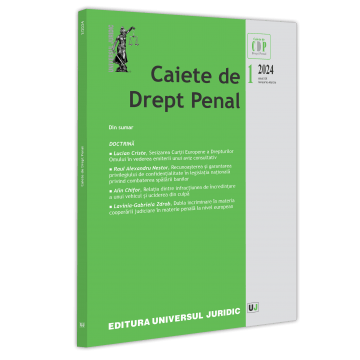Recognizing and guaranteeing the privilege of confidentiality in national anti-money laundering legislation
Abstract
In the context of Romania's location in the area of financial circuits used in the capitalization of money originating from criminal activities, considering the extremely sad experience of pyramid-type financial games with hundreds of thousands of people harmed, the national legislator becomes aware of the importance of an intervention in this sector, opting for the regulation of legal provisions to prevent and combat money laundering.
Starting from 1999, rallying to an international current of opinion that prioritizes the neutralization of criminal proceeds in the fight against economic-financial crime, the Romanian legislator begins to become more and more interested in identifying the financial beneficiary of the criminal activities, as in identifying, freezing and capitalization of the money obtained from illegal activities, several measures being adopted to prevent and combat money laundering, including the criminalization of certain behaviours as money laundering crimes.
As a consequence of this new vision adopted by the Romanian legislator, several traditional legislative concepts began to know limitations or redefinitions, the classic means of intervention against financial macro crime being necessary to be redefined or at least improved.
Under the influence of the F.A.T.F. Recommendations, during 2019, the national legislator proceeded to a substantial change in the legislation on the prevention and combating of money laundering, thus entering into force a new law, namely Law no. 129/2019 which generated the reconfiguration of some traditional doctrinal positions relative to the holders of the obligation to report a suspicious transaction, to the nature of the transactions that must be reported, as well as to the method of fulfilling the obligation to report to the competent structure at national level to record such reports issued by representatives of the legal professions.
Considering the specificity of the regulatory object, in practical activity there were several dysfunctions in the execution of the reporting obligation. Such difficulties were also generated by the fact that, under the decisive influence of the European legislation, the normative framework was adopted in the context in which, for a large part of the reporting entities, traditional legislation enshrined the guarantee of professional secrecy, such a guarantee having specific explanations for each profession, in the relationship between lawyer and client being considered even an essential aspect of the right to defence.
A regulation of the obligation to report suspicious transactions in accordance with the provisions of the Constitution, also represents a form of guaranteeing the prestige and independence of these professions, the legislator having both the obligation to prevent and combat any money laundering mechanism, as well as the obligation to ensure the attorney/client privilege of confidentiality.
The national legislative regulation is designed so that the intervention of the authorities in an activity characterized essentially by confidentiality, has a proportional and necessary character, being avoided any tendency that would lead to the denial of the substance of professional secrecy.
With certainty, the lawyer's role as guarantor of the right to defence in any legal proceeding would be essentially affected if, within a legal proceeding or in the period leading up to it, they were obliged to cooperate with the public authorities, by regulating an obligation to report data or information provided by the client himself based on specific contractual relationships.

